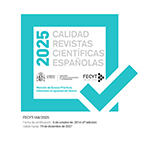La soberanía monetaria a debate: la historia del dinero y sus controvertidas implicaciones políticas
Resumen
En este trabajo examinamos el concepto de soberanía monetaria. Se requiere un análisis detallado de cómo se coordinan la política fiscal y monetaria y de las restricciones reales y artificiales para su operatividad con el fin de precisar las implicaciones políticas que son consecuencia del diseño específico del marco institucional, aspecto que habitualmente es ignorado en la literatura. La comprensión de la naturaleza de las operaciones implicadas está relacionada directamente con el entendimiento de una institución fundamental: el dinero. Por ello, primero analizamos qué es el dinero a través de su origen y los testimonios históricos que dan cuenta de aspectos relacionados con cómo aquello que una autoridad establece para redimir las obligaciones con ella consigue lograr la aceptación generalizada. Tras ello, ilustramos mediante una simplificación teórica del sistema económico contemporáneo las interrelaciones entre el Tesoro y el banco central, haciendo hincapié en las implicaciones que la teoría del dinero cartalista tiene para estudiar los diferentes pasos intermedios que disfrazan la función real de los impuestos y los bonos del Tesoro. A modo de conclusión, reflexionaremos sobre la importancia de diseñar un sistema monetario operativamente funcional cuyo pilar fundamental es la soberanía monetaria.
Descargas
Descarga artículo
Licencia
La revista Política y Sociedad, para fomentar el intercambio global del conocimiento, facilita el acceso sin restricciones a sus contenidos desde el momento de su publicación en la presente edición electrónica, y por eso es una revista de acceso abierto. Los originales publicados en esta revista son propiedad de la Universidad Complutense de Madrid y es obligatorio citar su procedencia en cualquier reproducción total o parcial. Todos los contenidos se distribuyen bajo una licencia de uso y distribución Creative Commons Reconocimiento 4.0 (CC BY 4.0). Esta circunstancia ha de hacerse constar expresamente de esta forma cuando sea necesario. Puede consultar la versión informativa y el texto legal de la licencia.











